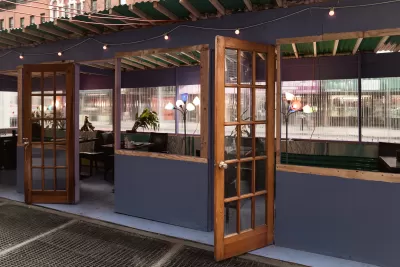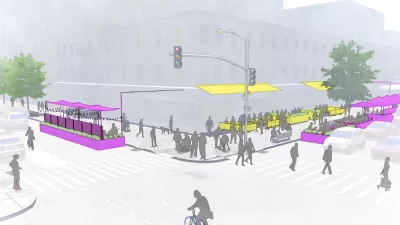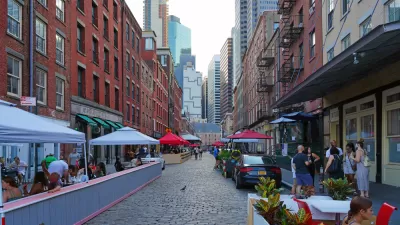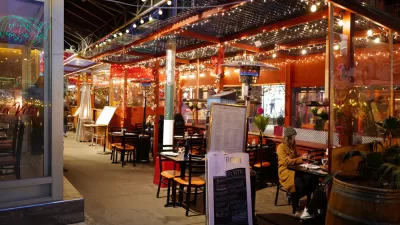Some restaurant owners worry the new requirements will make it too expensive to maintain outdoor dining structures.

Last Thursday, the New York City city council approved a bill permanently legalizing the outdoor dining structures that started dotting the city during the Covid-19 pandemic.
According to an article by Emma G. Fitzsimmons in The New York Times, “The bill aims to strike a balance by retaining a popular al fresco program while regulating it more closely, allowing for the clearing of abandoned or ugly dining sheds.” The bill also requires restaurants to take down the structures between November 30 and March 31, an addition that some restaurant owners say adds extra cost for dismantling and storage and reduces their ability to seat more customers during winter.
Under the bill, expected to be signed by Mayor Eric Adams, “the city’s Transportation Department would set basic design guidelines that have yet to be determined. Restaurants could offer outdoor dining from 10 a.m. until midnight and would be required to pay fees based on their location and square footage, with higher fees in Manhattan south of 125th Street.”
Supporters of the bill, like Kate Slevin, executive vice president at the Regional Plan Association, say the bill is “not 100 percent perfect” but provides a reasonable compromise. Others point out that the added expenses could exclude all but the most financially successful restaurants.
FULL STORY: New York City Is Poised to Make Outdoor Dining Permanent, With Caveats

Alabama: Trump Terminates Settlements for Black Communities Harmed By Raw Sewage
Trump deemed the landmark civil rights agreement “illegal DEI and environmental justice policy.”

Planetizen Federal Action Tracker
A weekly monitor of how Trump’s orders and actions are impacting planners and planning in America.

The 120 Year Old Tiny Home Villages That Sheltered San Francisco’s Earthquake Refugees
More than a century ago, San Francisco mobilized to house thousands of residents displaced by the 1906 earthquake. Could their strategy offer a model for the present?

Opinion: California’s SB 79 Would Improve Housing Affordability and Transit Access
A proposed bill would legalize transit-oriented development statewide.

Record Temperatures Prompt Push for Environmental Justice Bills
Nevada legislators are proposing laws that would mandate heat mitigation measures to protect residents from the impacts of extreme heat.

Downtown Pittsburgh Set to Gain 1,300 New Housing Units
Pittsburgh’s office buildings, many of which date back to the early 20th century, are prime candidates for conversion to housing.
Urban Design for Planners 1: Software Tools
This six-course series explores essential urban design concepts using open source software and equips planners with the tools they need to participate fully in the urban design process.
Planning for Universal Design
Learn the tools for implementing Universal Design in planning regulations.
Clanton & Associates, Inc.
Jessamine County Fiscal Court
Institute for Housing and Urban Development Studies (IHS)
City of Grandview
Harvard GSD Executive Education
Toledo-Lucas County Plan Commissions
Salt Lake City
NYU Wagner Graduate School of Public Service





























